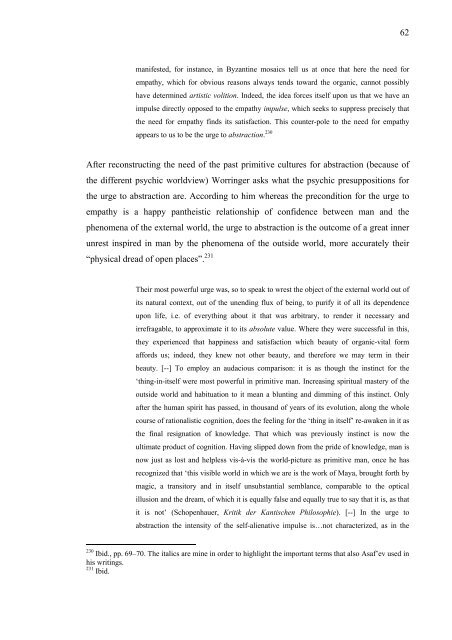Boris Asaf'ev and the Soviet Musicology - E-thesis
Boris Asaf'ev and the Soviet Musicology - E-thesis
Boris Asaf'ev and the Soviet Musicology - E-thesis
You also want an ePaper? Increase the reach of your titles
YUMPU automatically turns print PDFs into web optimized ePapers that Google loves.
manifested, for instance, in Byzantine mosaics tell us at once that here <strong>the</strong> need for<br />
empathy, which for obvious reasons always tends toward <strong>the</strong> organic, cannot possibly<br />
have determined artistic volition. Indeed, <strong>the</strong> idea forces itself upon us that we have an<br />
impulse directly opposed to <strong>the</strong> empathy impulse, which seeks to suppress precisely that<br />
<strong>the</strong> need for empathy finds its satisfaction. This counter-pole to <strong>the</strong> need for empathy<br />
appears to us to be <strong>the</strong> urge to abstraction. 230<br />
After reconstructing <strong>the</strong> need of <strong>the</strong> past primitive cultures for abstraction (because of<br />
<strong>the</strong> different psychic worldview) Worringer asks what <strong>the</strong> psychic presuppositions for<br />
<strong>the</strong> urge to abstraction are. According to him whereas <strong>the</strong> precondition for <strong>the</strong> urge to<br />
empathy is a happy pan<strong>the</strong>istic relationship of confidence between man <strong>and</strong> <strong>the</strong><br />
phenomena of <strong>the</strong> external world, <strong>the</strong> urge to abstraction is <strong>the</strong> outcome of a great inner<br />
unrest inspired in man by <strong>the</strong> phenomena of <strong>the</strong> outside world, more accurately <strong>the</strong>ir<br />
“physical dread of open places”. 231<br />
Their most powerful urge was, so to speak to wrest <strong>the</strong> object of <strong>the</strong> external world out of<br />
its natural context, out of <strong>the</strong> unending flux of being, to purify it of all its dependence<br />
upon life, i.e. of everything about it that was arbitrary, to render it necessary <strong>and</strong><br />
irrefragable, to approximate it to its absolute value. Where <strong>the</strong>y were successful in this,<br />
<strong>the</strong>y experienced that happiness <strong>and</strong> satisfaction which beauty of organic-vital form<br />
affords us; indeed, <strong>the</strong>y knew not o<strong>the</strong>r beauty, <strong>and</strong> <strong>the</strong>refore we may term in <strong>the</strong>ir<br />
beauty. [--] To employ an audacious comparison: it is as though <strong>the</strong> instinct for <strong>the</strong><br />
‘thing-in-itself were most powerful in primitive man. Increasing spiritual mastery of <strong>the</strong><br />
outside world <strong>and</strong> habituation to it mean a blunting <strong>and</strong> dimming of this instinct. Only<br />
after <strong>the</strong> human spirit has passed, in thous<strong>and</strong> of years of its evolution, along <strong>the</strong> whole<br />
course of rationalistic cognition, does <strong>the</strong> feeling for <strong>the</strong> ‘thing in itself’ re-awaken in it as<br />
<strong>the</strong> final resignation of knowledge. That which was previously instinct is now <strong>the</strong><br />
ultimate product of cognition. Having slipped down from <strong>the</strong> pride of knowledge, man is<br />
now just as lost <strong>and</strong> helpless vis-à-vis <strong>the</strong> world-picture as primitive man, once he has<br />
recognized that ‘this visible world in which we are is <strong>the</strong> work of Maya, brought forth by<br />
magic, a transitory <strong>and</strong> in itself unsubstantial semblance, comparable to <strong>the</strong> optical<br />
illusion <strong>and</strong> <strong>the</strong> dream, of which it is equally false <strong>and</strong> equally true to say that it is, as that<br />
it is not’ (Schopenhauer, Kritik der Kantischen Philosophie). [--] In <strong>the</strong> urge to<br />
abstraction <strong>the</strong> intensity of <strong>the</strong> self-alienative impulse is…not characterized, as in <strong>the</strong><br />
230<br />
Ibid., pp. 69–70. The italics are mine in order to highlight <strong>the</strong> important terms that also Asaf’ev used in<br />
his writings.<br />
231<br />
Ibid.<br />
62

















